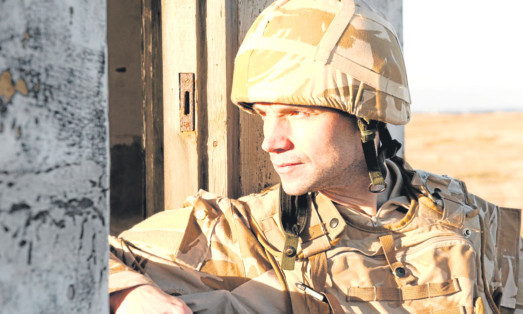
If a soldier is shot or blown up in the line of duty they, quite rightly, receive sympathy, care and understanding.
But those who are left with a broken mind do not receive the same treatment and that has to change.
One way do that is to raise awareness, and top Scottish actor Scott Ryan Vickers, who plays DC Will Cooper in River City, is doing just that.
He has created, directed and stars in a remarkable short film that tackles the subject of Post Traumatic Stress Disorder, especially the effects on members of the armed forces who have served in war zones.
Advance To Contact is based on a true story of a soldier who suffered from extreme PTSD.
It also stars noted actress Frances Barber, Matthew Crompton, who has appeared in Brookside and the Bill, and former Hollyoaks star Sarah Jayne Dunn.
It’s an extremely powerful film which graphically illustrates how PTSD not only affects the sufferer but also everyone around them.
Right now, this condition is a time bomb waiting to go off among our troops returning from Afghanistan, and those affected will need help for years, if not decades, as often symptoms don’t manifest themselves immediately.
In really extreme cases sufferers attempt or actually manage to commit suicide. What they need is more help and greater awareness.
Even today there is a reluctance among our troops to seek aid because of the possibility of being stigmatised. Clearly we need a change of attitude.
Of course, it’s not just members of the armed forces who suffer from PTSD.
Scott himself was diagnosed with the condition following the death of his beloved sister Jeannine, who died of a brain tumour when he was just 19. He suffered from depression and panic attacks, but was only diagnosed with PTSD 14 years later.
Scott received proper help and has become a hugely successful actor but he is passionate about sharing his experiences and making a difference.
He has used his savings to make the film and proceeds will go to Erskine Hospital for war veterans.
I attended the premier recently alongside Judy Murray and a specially invited audience.
The lively question and answer session afterwards taught me a lot and I really believe the film should be shown in schools, colleges and universities to raise awareness and highlight PTSD.
Scott has done a remarkable job and should be praised to the skies for his commitment and generosity of spirit.
You can download Advance To Contact on iTunes at tinyurl.com/prhoytd

Enjoy the convenience of having The Sunday Post delivered as a digital ePaper straight to your smartphone, tablet or computer.
Subscribe for only £5.49 a month and enjoy all the benefits of the printed paper as a digital replica.
Subscribe